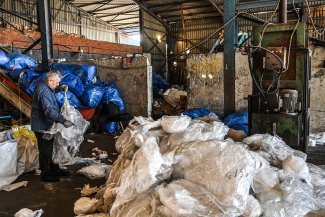Exposing illegal acts discovered in the course of one’s work can have dramatic repercussions on the lives of people referred to as ‘whistleblowers’. And yet there has been a spike in the number of those whistling in the face of danger since the mid-2000s.
In 2009, Ana Garrido Ramos was working as a simple employee at a town hall in the suburbs of Madrid when she exposed a corruption network operating within the Spanish People’s Party (PP). The ensuing scandal was without precedent. Fearing reprisals, she decided to leave the country, without a single thing, and take refuge in Costa Rica. She is now back in Spain and scraping together a living from the sale of fashion jewellery. Former driver Karim Ben Ali also lost everything, in 2017, after denouncing Arcelor Mittal, the company he was working for through a subcontractor, in eastern France, and that had him dumping toxic liquids directly into the ground, without any regard for the environment.
Exposing illegal acts discovered in the course of one’s work can have dramatic repercussions on the lives of people referred to as ‘whistleblowers’, ranging from the loss of work to intimidation and even prosecution. Such was the fate of Antoine Deltour, the French auditor working for PricewaterhouseCoopers (PwC) in Luxembourg who was behind the LuxLeaks exposing the international tax scandal. Deltour was sentenced to 12 months in prison before finally being acquitted by the courts of Luxembourg, which recognised his action as being in the “public interest”.
In the absence of adequate legal protection, playing the role of vigilante can be a risky business, and the potential consequences are likely to deter more than a few. And yet there has been a spike in the number of those whistling in the face of danger since the mid-2000s.
“The increase in the number of whistleblowers can be explained by the trend towards the financialisation of companies, which leads to a split between the directors and the executives who find themselves having to apply decisions with which they disagree, considering them to be against their organisation’s long-term interests and the general interest. It’s what’s known as an ethical conflict,” says Sophie Binet, head of the UGICT, the CGT-affiliated union representing executive, engineering and technical workers.
In 2014, only six of the then 28 EU member states had comprehensive national laws to protect whistleblowers. In 2019, the figure rose to ten, but the safeguards are often piecemeal, hard to access and, above all, very different from one country to the next. It was these disparities that members of the European Parliament set out to remedy after seeing the repercussions of the LuxLeaks affair. “The newly elected president of the European Commission at the time was Jean-Claude Juncker, Luxembourg’s former finance minister. Not long after receiving the 2015 European Citizen’s Prize, Deltour found himself answering to the courts. This inconsistency was widely covered in the European media,” recalls MEP Virginie Rozière. Meanwhile, the European Commission was organising the vote to pass a directive on the protection of ‘trade secrets’, under strong pressure from business lobbies. “The Parliament seized the opportunity to put the issue of whistleblowers on the agenda,” explains the MEP, who was a co-rapporteur on whistleblower protection.
Initially, the European Commission refused to examine the proposal. But back in the European Parliament, a group of elected representatives dug its heels in and began organising working groups, while NGOs, which had come together to fight against the trade secrets directive, were remobilising their troops to fight for the adoption of a whistleblower directive. “Given the approaching elections and the Commission’s poor track record on freedoms, it finally accepted the European Parliament’s proposal for a directive in March 2018,” continues the MEP. The Directive on the Protection of Persons Who Report Breaches of Union Law (Whistleblower Directive) was drafted and adopted by the EU executive and all the justice ministers of the member states within the record time of just one year.
A distinctly European definition of whistleblowing
The text took inspiration from the French law known as ‘Sapin II’, [editor’s note: named after former socialist minister Michel Sapin], which was the most advanced legislation in force within the EU at the time, but is more restrictive in its scope: the Sapin II law covers the reporting of any information constituting a “threat to the general interest”, whereas the new directive only takes into account breaches of European Union law. The directive is, however, more beneficial in that it not only protects the whistleblower but also the person or institution that facilitates the procedure, and only requires good faith, whereas the Sapin law required that the whistleblower be impartial.
But the battle waged by the European Parliament was primarily focused on the process that the whistleblower has to go through to secure protection. The Sapin law required the whistleblower to first report the information through internal channels – within the company or organisation where the breach took place – and then, if no action was taken, through ‘external’ channels – such as the judiciary. And it was only in the absence of a response from that external channel that the information could be made public, through the media.
The process was highly restrictive, and excluded workers’ representatives, for example: “If, as an employee, you entrusted your secret to a trade unionist, you lost your protected status as a whistleblower, because you had not respected the process,” explains CGT’s Binet.
This ‘hierarchy of channels’ created a range of other problems. “Regardless of whether the information was collected by an ethics officer employed at the company or by an external service provider subcontracted by the company, these internal channels were problematic, given the underlying relationship of subordination, especially in the case of systemic whistleblowing, which poses a threat to the organisation itself, and therefore to the income of the people receiving the report,” explains Rozière. Moreover, as Eric Alt, president of Anticor, the French anti-corruption association, points out, “Corporate hierarchies are often very aware of what is happening under their own roof. Informing them early allows them to potentially silence the alert.”
This hierarchy of channels was the main stumbling block during the negotiations between the Commission, the Council and Parliament. Parliament was in favour of removing these constraints, the Council was against. The lobby led by the coalition of NGOs and trade unions – including Anticor, Transparency International and Eurocadres – was successful in persuading a section of the elected representatives of the need to topple the hierarchy of channels. A directive was finally achieved that permits the bypassing of internal and external channels, if there are reasonable grounds to believe that the matter is urgent or if there is a risk of retaliation or inaction.
The directive also stipulates that the anonymity of those recognised by the European courts as “whistleblowers” is protected and that penalties will apply to anyone revealing their identity. It stipulates that states should create institutions capable of providing legal aid or even financial assistance, that whistleblowers should enjoy immunity from liability for any unlawful acts (violation of copyright, data protection rules, disclosure of trade secrets, etc.) committed to secure evidence of breaches of EU law, and be protected against libel action. Should the organisation reported by the whistleblower take the case to court, it is up to the organisation, and not the whistleblower, to establish that this is not an act of reprisal. Finally, the directive states that whistleblowers should be “compensated in full” for any damage suffered as a result of the action taken.
How to apply it in practice?
How is all this going to translate into practice? The text states that companies with over 50 employees and municipalities with over 10,000 residents must set up reporting systems that guarantee impartiality, confidentiality and the proper handling of reports. Similarly, member states will have to ensure that independent and autonomous external reporting channels are established for receiving and handling information on breaches. “The European directive insists more than the Sapin law on the follow-up procedures,” comments Nicole-Marie Meyer of Transparency International. It specifies the deadlines within which the relevant authorities have to respond to breaches reported by employees and citizens: acknowledgement of receipt within seven days and response within three months, for both internal and external channels.
Since the directive was adopted, almost seven months ago, stakeholders and observers have been trying to resolve the matter of how it will translate in practice, as a number of grey areas remain. What form will the internal channels take in companies with more than 50 employees and in municipalities with more than 10,000 inhabitants? Who will be in charge of these channels and ensure that they work properly? As Meyer points out: “The Sapin law, on which the EU directive is modelled, required territorial civil service employers to set up ethical reporting systems as of 1 January 2018. In early 2020, only 30 per cent of them had done so.”
“Workability is a real issue,” admits Rozière. “Implementing the directive is complicated, especially since we have no idea how many reports will have to be processed. But the important thing was to write into law that the act of whistleblowing, the disclosure of information, should no longer be considered an offence and that the whistleblower should benefit from immunity,” the MEP continues.
Alt is of the same opinion. “The directive provides a framework. It may be a blunt weapon, but it’s a weapon all the same. The key is to establish the legitimacy of the whistleblower, to roll back the culture of impunity and retaliation, because these people who defend the public interest are absolutely crucial.” The very existence of the text is a victory, particularly for France, where whistleblowers are often likened, by their detractors, to informers, the dark figures of the Second World War.
But the NGOs united in a coalition during the European parliamentary battle do not intend to leave it at that. In France, they published an open letter to President Emmanuel Macron on 7 November 2019, insisting that the provisions enshrined in the Sapin II law be preserved, particularly with regard to its wider scope, and combined with those gained with the directive that had just been adopted. The letter also calls for the inclusion of the Council of Europe’s recommendations, by extending whistleblower status to legal persons, for example, to encourage “reporting auxiliaries” and to avoid exposing vulnerable and isolated individuals, as well as extending the definition of facilitator to NGOs. The implementation and translation into practice of the whistleblowing legislation in each of the 27 countries will present NGOs and trade unions with a high-stakes political battle that will have to be fought tooth and nail between now and 2021. “We will have to remain alert and mobilised to ensure a high level of transposition into national law,” concludes Binet.










